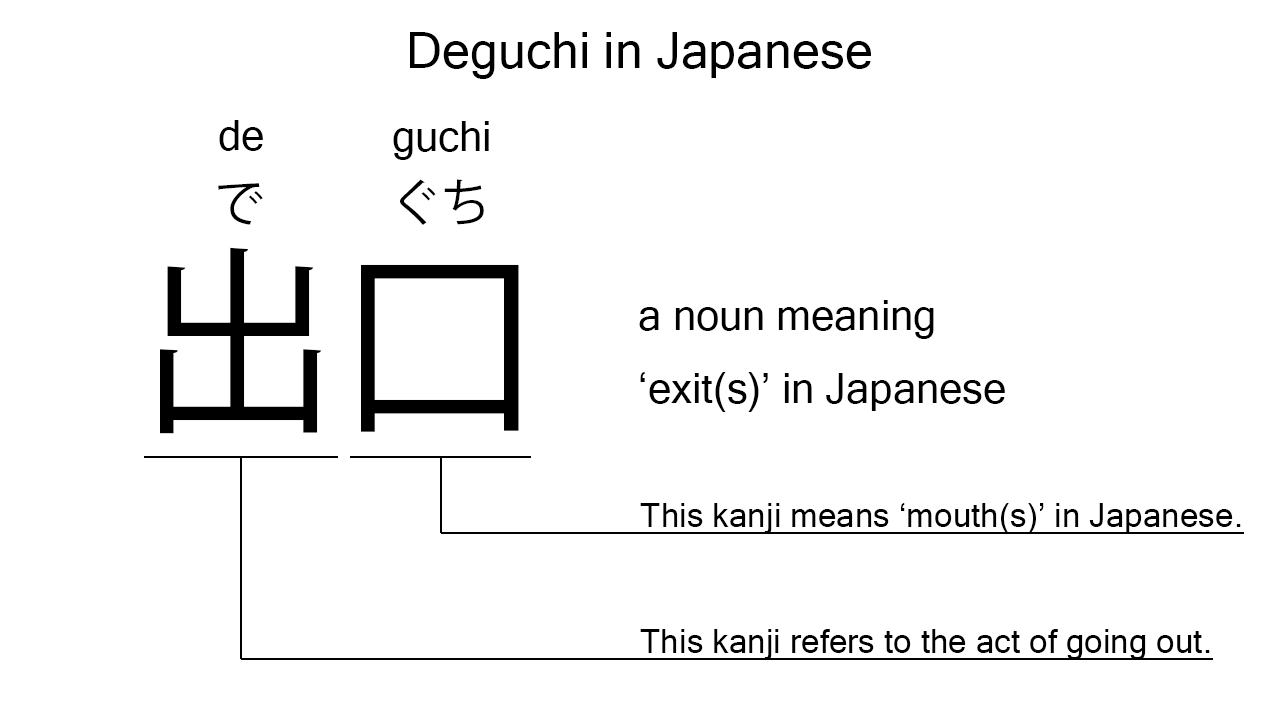What does “deguchi” mean in Japanese?
Native speakers say “deguchi” to mean ‘exit’ in Japanese. Perhaps, some Japanese learners know this word as it is sometimes used in Japanese conversations. In this blog post, however, I will explain this word in detail based on its kanji expression. And also, I will explain how to use it through example sentences. My explanations would help Japanese learners understand “deguchi” more clearly. Then, let’s get started!
Contents
Definition and meaning of “deguchi”
Let me start with the definition and meaning of “deguchi”.
- deguchi – 出口 (でぐち) : a noun meaning ‘exit’ in Japanese. This can also work as plural. Learn more about Japanese plural.
The definition and meaning are simple and clear. To understand this noun more clearly, however, let me explain its kanji characters in detail, one by one.
What does “deguchi” literally mean in Japanese?
The kanji expression of “deguchi” consists of the following two kanji characters:
- 出 : a kanji character used to refer to the act of going out.
- 口 : a kanji character used to mean ‘mouth’ in Japanese.
These two kanji characters tell us that the formed noun literally means a ‘mouth for going out’ in Japanese. This literal interpretation is not completely in line with the actual meaning, but still understandable, I think. Exits are often the mouths of rooms which let us go out.

When we meet new kanji expressions, we should check their kanji characters in detail to understand their meanings clearly and deeply. In many cases, kanji characters tell us a lot about the meanings of the expressions they form. Actually, here, we could get the better understanding of “deguchi” through the detailed kanji check above.
So far, I’ve explained the definition and meaning of “deguchi” together with its kanji characters. Then, let me explain how to use it through the example sentences below.
Example #1: how to say “where is the exit?” in Japanese
deguchi wa doko desu ka – 出口はどこですか (でぐちはどこですか)
Where is the exit?
Below are the new words used in the example sentence.
- wa – は : a binding particle working as a case marker or topic marker. In the example, this works after “deguchi” to make the subject in the sentence.
- doko – どこ : an interrogative pronoun meaning ‘where’ in Japanese. This is widely used in Japanese where questions.
- desu – です : an auxiliary verb used after a noun or adjective to make it polite. Probably, this is well known as a part of Japanese desu form. In the example, this is used after “doko” to make it sound polite.
- ka – か : a sentence-ending particle used to make a question. As the definition suggests, this is used at the end of the example sentence to make the question.
This is a typical usage of “deguchi”. In this example, it works as a part of the commonly-used phrase, “deguchi wa doko desu ka”, which means ‘where is the exit?’ in Japanese.
Example #2: another usage of “deguchi”
are ga deguchi desu yo – あれが出口ですよ (あれがでぐちですよ)
That is the exit.
Below are the new words used in the example sentence.
- are – あれ : a pronoun used to refer to something not close to the speaker. In the example, this is used to say “that” in Japanese.
- ga – が : a case particle used to make the subject word or the object word in a sentence. In the example, this is used after “are” to make the subject in the sentence.
- yo – よ : a sentence-ending particle used to state the fact or idea in a soft way. As the definition suggests, this is used at the end of the example sentence to state the fact softly.
This is another typical usage of “deguchi”. In this example, it works as the complement in the sentence. When we want to mean an ‘exit’ or ‘exits’ in Japanese, anyway, this noun is always a very good option.
Summary
In this blog post, I’ve explained the definition and meaning of “deguchi” in detail based on its kanji expression. And also, I’ve explained how to use it through the example sentences. Let me summarize them as follows.
- deguchi – 出口 (でぐち) : a noun meaning ‘exit’ in Japanese. This can also work as plural. These two kanji characters literally mean a ‘mouth for going out’ in Japanese. This literal interpretation is not completely in line with the actual meaning, but still understandable, I think. Exits are often the mouths of rooms which let us go out.
Hope my explanations are understandable and helpful for Japanese learners.
Leave a Reply